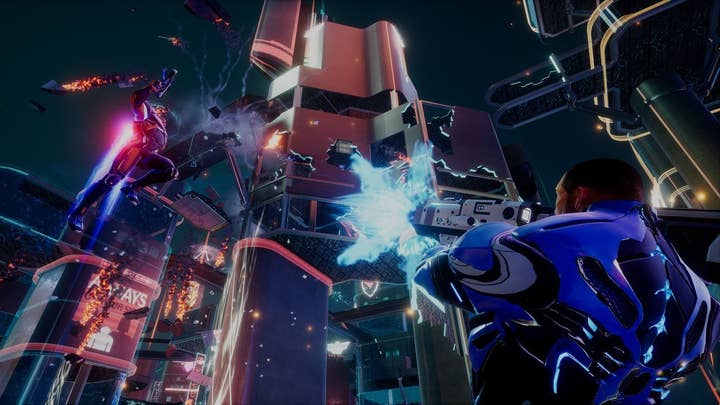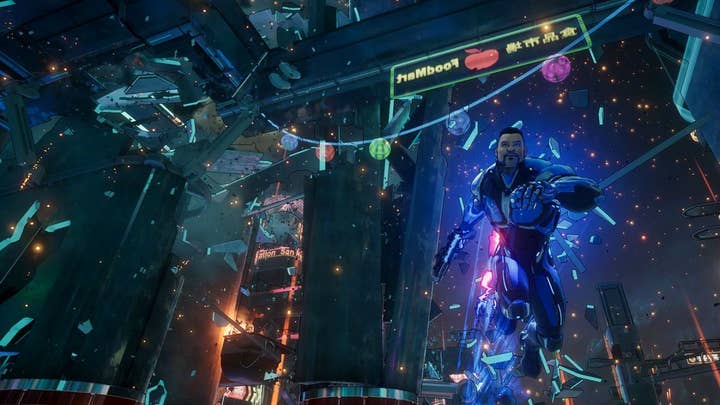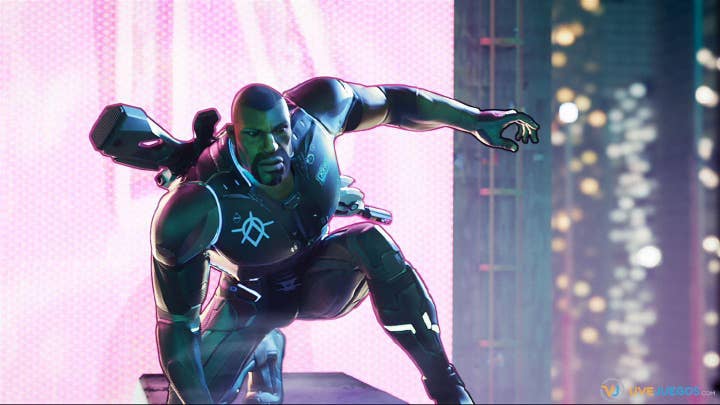Crackdown 3: Critical Consensus
The long-awaited sequel has arrived to tepid reviews, but what do sales and scores matter in the era of Xbox Game Pass?
For critics who pride themselves on objectivity, Crackdown 3 presents an interesting challenge.
The first in the series, Realtime Worlds' Crackdown, is 12 years old this week, yet the love for that game remains strong among a certain (most likely dwindling) group of people. The second, Ruffian Games' Crackdown 2, was altogether less lovable, but it's fair to say that its deficiencies are as important to the existence of a third game as the more obvious qualities of the first. It created an abiding sense that Crackdown deserved better; a belief in its unrealised potential strong enough to stir a room full of E3-weary journalists into heartfelt applause at the mere sound of an orb being collected.
That, though, was 2014, when Crackdown itself was a sprightly seven years old. Crackdown 3 was saddled with a host of promises around cloud computing and destructible environments, promises that Xbox would bolster at Gamescom the following year. Since then, the game has appeared lost in a sea of changing developers, slipped release dates, and car-crash industry gossip.
"It is what it is. Expect nothing more from it and you'll have a fun time"
Kotaku
The challenge for critics, then, is to review the game, and not the story behind it; to review what they have been given, rather than what it was supposed to be. Is Crackdown 3 the final proof of a broken promise? Or a an unexpected pleasure at the end of a torturous development?
With Crackdown 3, virtually every single critic appears to have landed in the middle, its Metacritic roster a beige chorus of fives and sixes, the rogue sevens balanced out by the odd three or four. USgamer settled nearer the top of the pack, giving Sumo Digital (the game's credited developer) a pat on the back for preserving what made the series so beguiling in the first place.
"Leveling up is expected in a game like Crackdown 3, but it's handled perfectly here," USgamer said in its review. "By constantly upping my agent's combat effectiveness and agility, my time in the game became more and more fun as I progressed.
"Mechanically, Crackdown 3 just works. The firearms provide a neat mix of rapid-fire assault rifles, science fiction blasters, and ultimate destruction ballistics, which when combined with your agent's aerial acrobatics and numerous foes, makes for smile-on-your-face fun. There's nothing overly complex here... but the way the game ramps up the conflicts until you're air-dashing between an all-encompassing barrage of lethal pyrotechnics is hugely entertaining."

The idea of Crackdown 3's pleasures being tied to what the player expects is at the core of so many reviews -- both positive and negative. Kotaku opened its review by describing it as "refreshingly uncomplicated" and "a game that requires zero thought", but no worse for all of that.
"It flies by in a blur of explosions, shootouts and flying cars, concealing its many imperfections in a neverending whirlwind of action," Kotaku said. "It is what it is. Expect nothing more from it and you'll have a fun time."
And yet this easy-going take is built on acceptance of the flaws that support the arguments of its harshest critics. Kotaku also noted that "everything in Crackdown 3 feels insubstantial", from a lack of feedback in its shooting and melee combat, "loose and slippery" vehicle handling, and buildings that seem impervious to the fiery, kinetic chaos being caused by the player.
"It feels like a gussied-up first-generation Xbox One game"
Giant Bomb
"This is odd, because if you recall Crackdown 3's announcement and the first few waves of pre-release hype a few years back, you might remember that the whole thing was supposed to be built upon unprecedented environmental destruction enabled by Microsoft's fancy cloud computing. Now, the destruction has been relegated to a competitive multiplayer mode called Wrecking Zone, a distressingly limited duo of modes where you play in a small, virtual facsimile of a city, rather than the sprawling TerraNova island."
If Kotaku's experience is an accurate reflection, critics had only limited access to Crackdown 3's multiplayer modes, but few seem genuinely intrigued to try more. Giant Bomb, for example, offered perhaps the harshest appraisal of all the big-name websites, questioning even the satisfaction that the collection of orbs now provides. That simple mechanic is, after all, at the very root of why a third game exists at all, but 12 years on from the first game, it no longer feels like enough.
"This one really feels like it's going through the motions at every turn, with an utterly lifeless story and generic missions that feel like they were clone-stamped into the world for you to do over and over again," Giant Bomb said. "Every monorail station takeover mission feels identical. There are roughly two types of industrial/chemical missions. Two types of enforcer missions. And so on.

"Completing the campaign with almost all of the non-race missions completed took me somewhere around six or seven hours. You can go back in, you can take your leveled agent into a reset city, and you can play on multiple difficulties, but I'm not sure why anyone would want to do this stuff a second time. It's not bad, but nothing about it stands out.
"Here in 2019, it feels like open-world games have gone out and into favor at least once or twice since that last Crackdown came out. But Crackdown 3 shows very little in the way of learning from the past or learning from the other open-world games that have graced consoles over the last nine years. Instead it feels slight, mindless, and dull. It feels like a gussied-up first-generation Xbox One game. Like the sort of game you might have expected to hear about back in 2014. In the here and now, though, there's... way less room for this sort of game on store shelves."
"It's an unusual situation, being faced with a game that feels like it was specifically designed not to be bought"
The Daily Telegraph
This is the opposite angle on the difficult relationship between the reality of Crackdown 3 and the expectations created by years of hype and dubious promises. But in that last sentence, Giant Bomb touched on an idea that simply wasn't the case when the game was first announced at E3 2014, or even two years ago; the truth is that Crackdown 3 doesn't have to find its place on store shelves, because it can exist in the infinite space of Xbox Game Pass, where the value of any individual experience need only add up to a small part of $9.99 a month.
Some people will pay $60 for a copy of this game, but for the vast majority it will be just another option on Microsoft's disruptive subscription service, one of more than 250 potential justifiers of a $10 monthly subscription fee. Many critics recognised this concept -- a concept, it should be noted, that is something of an existential threat to their entire craft -- but few met it head-on like The Daily Telegraph. Everything in Crackdown 3, it said, seems to exist to satisfy a whim, to be there "if you feel like doing it".
"It's an unusual situation, being faced with a game that feels like it was specifically designed not to be bought. But that's very much the case with Crackdown 3.
"And Crackdown 3 feels like it was designed to give Game Pass owners something to do when they're bored and don't want to commit to anything. It's so single-minded and inoffensive that it seems unlikely Microsoft expect people to pay AAA prices for it. Rather than the system seller it once was, Crackdown 3 feels more like a fun freebie for Game Pass owners."
Whether that strikes you as positive or negative is -- at this point, with subscription services still a new concept in the console space -- largely a personal matter. Crackdown 3 will be judged by a different set of criteria to sales and scores, making Xbox Game Pass a more suitable home for troubled AAA productions than any in this industry's history.
Anyone excited for Platinum Games' Scalebound, which was culled before Xbox Game Pass was even announced to the world, now has cause for reflection. They can look at Crackdown 3 -- which once aimed so high, and survived by refocusing on a homely set of first principles -- and wonder what might have been.

